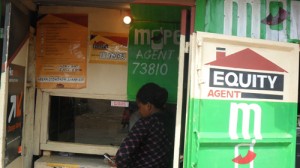In the past, poor people living in Nairobi slums experienced problems when attempting to gain access to financial services. This was because banks were not near their localities and they were forced to travel significant distances in search of a bank.
What this meant, for someone living in an out-of-the-way informal settlement, was that they would have to cut out a large part of their day to travel and then stand in queues. Transportation costs also had to be taken into account; more often than not, the whole endeavor would prove extremely time-consuming and costly.
Since 2010, however, there have been significant improvements in the banking sector with the introduction of agent banking, an innovative delivery channel that seeks to bring access to financial services much closer to poor people.
James Mwangi, the owner of a Kibera Equity bank agent outlet, explains how it works. “To become an Equity agent, you need to have an existing business — e.g. a consumer goods distribution, a supermarket, or a petrol station. For you to transact any business at the Equity agent-banking outlet, you need to have a registered bank account. Transactions are made with a system called Mkesho.”
Mkesho is a bank account that facilitates the transfer of money to and from your mobile phone Mpesa account and your Equity Bank account. The system offers extra benefits, such as receiving text messages confirming that you have made a deposit or withdrawn money.
Mwanghi feels that the system has been a big boost to the community, especially for people for whom mobility out of the slum can prove challenging. “Most of the people I serve are women and youths who have small businesses here in the neighborhood — mostly beauty salons, groceries, and those selling secondhand clothes.”
In Equity’s view, agents are the future for retail banking in Kenya. The principal value of the model, they say, is its use of mobile phone technology to bring affordable financial services to new customers who live in remote geographic areas within urban and rural settlements.
Kibera slum, with its huge population, has proved a good starting point, as its opportunities match Equity’s growth strategy.
More than 1,000 agents are already operating under the Equity network. This is important to Equity, which seeks to cut costs on physical branch expansion and staff hiring.
Apart from this, tapping into the predominant unbanked rural and urban-slum population is crucial for deepening access to financial services which will, in turn, help realize Kenya’s Vision 2030 — a blueprint geared towards economic, political, and social stability.
Margaret, a beauty salon owner, explains how the agent-banking model has worked in her favor: “Before this initiative came, I used to have a lot of trouble with my customers [getting calls all the time] asking where I was. With the long queues and the fact that I had to use money for transport to get to the nearest Equity two kilometers away, it always took me hours to make a transaction at the bank, and this only meant losing out on customers who had come to have their hair done.
“Luckily, I never do that anymore, because the Equity agent is just at my doorstep; hence, no more calls from customers — and if there are, it’s only to confirm the time they will be coming. This has contributed immensely to my business growth, and if all goes well, I have plans to open another salon in Makina village,” one of the
13 villages of Kibera.
The emergence of this new cash economy in remote areas, market centers, and slums is bringing hope to many Kenyan communities. This assessment coincides with the view of Equity CEO Dr. Mwangi as expressed at the agent banking launch: “This is likely to be the biggest business in Kenya’s entrepreneurial space. You helped us create the Equity brand. You were the warriors and heroes of creating the Equity brand. It’s your turn now to benefit from it.”
Originally posted on urb.im

